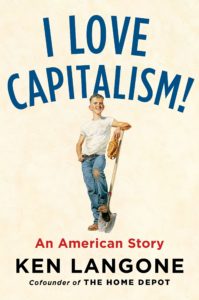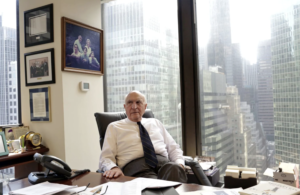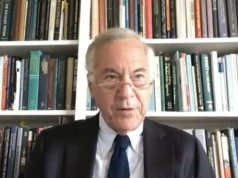 Economics was dubbed “the dismal science” by historian Thomas Carlyle not, as some think, regarding Thomas Malthus’s bleak view of a future balance of population and resources. It was, rather, Carlyle’s belief that slavery was a more moral institution than the free market for slaves and people of color. He was calling John Stuart Mill’s capitalist, free market theories “dismal.”
Economics was dubbed “the dismal science” by historian Thomas Carlyle not, as some think, regarding Thomas Malthus’s bleak view of a future balance of population and resources. It was, rather, Carlyle’s belief that slavery was a more moral institution than the free market for slaves and people of color. He was calling John Stuart Mill’s capitalist, free market theories “dismal.”
There are other names for Carlyle’s theories. Don’t take it out on economics.
I Love Capitalism by Ken Langone is the happiest book going about economics, economies, or people making money, and people spending it. Capitalism, contrary to the rising flock of young “socialists” who refuse to look at the socialist hell-hole that is our sad neighbor Venezuela, is the best way ever devised to let people rise, live well, spend money, and give it away in large chunks.
From the story of his poor early life to his very wealthy 9th decade, Langone sings what he calls a “love song” to capitalism. Founder and chairman of Invemed Associates LLC, and perhaps best known as an early partner in Home Depot, Langone tells the quintessential boot strap story of an outsider, poor and Italian in the 1950’s WASP culture of Wall Street.
His maternal grandfather was illiterate in both Italian and English, working the sand pits of Long Island. His one luxury was Saturday afternoon spent with Texaco’s Metropolitan Opera on radio. [As it was for my own non-English-speaking, Jewish grandfather from Riga. I’m betting his grandfather sang along, too.] His father was a plumber and his mother a cafeteria worker – neither graduated from high school. Their legacy to Langone was love and hustle. Work every day. Work at anything. Work at everything. Work some more. Take two jobs if two are available. No job is beneath you, no job too dirty. Just work. And when you’re finished, work some more.
And get an education.
After an “iffy” high school career, he managed to get into Bucknell University in Pennsylvania, where various students, friends and professors alternately opened doors for him, got him into trouble, and got him out again. Bravado and a night school MBA took him through his early positions on Wall Street, where the culture was dominated by hereditary bankers and brokers. Blunt honesty took him farther. And really good decision-making took him farther still.
To Wall Street and Beyond
The middle of the book is a travelogue of companies, IPOs, leveraged buyouts, corporate finance, mergers, and selling stocks and bonds. You don’t have to understand the mechanisms to enjoy the story – “You’re going to probably pay 6 percent and it’s going to be for a ten-year term. I can probably get the bondholder to take no repayments for the first two years, and then eight equal payments for the last eight years, fully amortized.” What is important is that Langone never made a deal without understanding the company or product or the person at the center of it. Refractories, pajamas, oil, plungers? He knew about them. People? He understood them. Ross Perot, Bernie Marcus, Arthur Blank, Frank Borman, Ed Braniff? They knew him and trusted him.
Instinct kept him away from Bernie Madoff.
Langone, like all good capitalists, worked for himself and his family – a wife he clearly adores and his children. “I knew exactly what I had to do. I had three kids to feed and educate and provide a home for, and all I knew was I had to go out and kill every day to eat. So, I wasn’t producing for [my bosses]. I was producing for my family.”
That’s the setup.
The payoff is watching a craftsman at work, gently sculpting deals, moving the parts to get where he wanted to be and with whom. And then, there is the super-payoff.
Langone’s long relationship with Ross Perot almost didn’t get started. Having been told that he had half an hour – to the minute – for the meeting, and Perot having spoken for most of that, Langone told Perot he had no time to make his presentation, so he would just say goodbye and leave. Perot kept the meeting going for 13 hours. Perot ultimately bought into the Langone way of doing business, and Langone produced an IPO that Fortune magazine called “the greatest personal coup in the history of American finance.”
You don’t need to know how an IPO works to get the point.
He was also willing to walk away. Hot on the heels of the Perot EDS deal, a situation arose in which people holding the stock were about to make a lot of money. Someone in Langone’s firm wanted to use the information to buy up the stock ahead of the situation – “front running” Langone called it; “insider trading” most of us would say. Langone immediately told the senior members of his firm that he was leaving because he wouldn’t work in a firm in which that was tolerated. The senior partners fixed it and Langone was shortly elected president of the firm.
Into companies, out of companies, and the fascinating story of what didn’t work at Handy Dan, and did work for its successor, Home Depot.

The Super Payoff
Aside from feeding his family – which could have been done on a lot less money than he ultimately made – what moved Ken Langone? This is the super payoff and the heart and soul of I Love Capitalism.
Langone made it to give it away.
Today, when capitalism and wealthy people are under increasingly intense political attack, it is worthwhile to consider the charitable giving of the wealthy.
Can the government build a hospital? Of course it can. With all of government’s bureaucratic excesses, inefficiencies, and meandering funding streams, a hospital could probably, eventually, arise where it was supposed to be – or at least where congressmen and city councilmen wanted it. But the story of Langone and NYU Medical Center is the story of what happens when business, money, and the charitably inclined come together.
NYU Medical School had merged with Mt. Sinai Hospital and both were in shambles. Langone was offered the chairmanship of the medical school. As he did with his business ventures, he investigated the problems, met the people, made decisions about how to improve the institution, and jumped in. Then he put $100 MILLION into it – anonymously. Then he went to friends and solicited gifts of $35 million, $150 million, $100 million, and $50 million and more. His second gift of $100 million was public in hopes of encouraging others.
THAT, a government cannot do.
Capitalism is not a charitable institution, but capitalism provides the means for charitable people to help the rest of us. Langone figures that “everything I own – the plane, the houses, the cars – and even including all the yearly maintenance, the som comes to about one-third of the total amount of money that we’ve given away.” His charities include the Animal Medical Center, the Boys’ Club of NY, Bucknell University, Harlem Children’s Zone, and St. Patrick’s Cathedral. His wealth allowed him to serve on boards including Ronald McDonald House NY, the Center for Strategic and International Studies (CSIS), the Horatio Alger Society Foundation and more.
All that from the grandson of Italian immigrants who came to America with nothing but the will to work.
Capitalism, then, is the mechanism by which people can start with very little, work very hard, and end up better off. Not necessarily millionaires, and “better off” isn’t only about money, but, according to Langone, how ever many rungs you climb on the ladder, you are obliged to share your success. People across the book rise and Langone enjoys watching and helping.
“I Can’t Forgive”
It isn’t all sweetness, though. Sometimes you have to fire people – not nice, but necessary. Sometimes, you run afoul of the authorities whether or not you did what they said you did. One of the most interesting sections is about how Eliot Spitzer, the ambitious and conniving attorney general of New York, went after Langone and one of his partners.
Spitzer took the issue of compensation for the president then-CEO of the New York Stock Exchange, David Grasso – who had worked his way up from unionized clerk to the top of the heap. His compensation was determined by a formula devised by a committee of which Langone later became chairman. In the hot and heavy late 1990s, the formula resulted in a lot of money for Grasso. A lot. But by 2003, when things were slowing, the amount rankled some people – including Spitzer and N.Y. state Comptroller Alan Hevesi. Under pressure, Grasso resigned. And then Spitzer filed a law suit against him and Langone, calling Langone a “serial overpayer,” although Langone had nothing to do with the formula or the result.
It was a bitter and nasty fight. Langone wrote:
The only thing that disappointed me about that episode in my life was the number of my friends who called me saying, “Why don’t you settle with this guy?” I wasn’t offended, but I was hurt that they didn’t understand how I’m put together. My stand had nothing to do with loyalty to Grasso. It had everything to do with feeling I’d done the right thing. And I would do it again. Anyone who really knew me knew that I’d sooner jump off the Brooklyn Bridge than settle with that weasel.
He won, and couldn’t help gloating just a little when Spitzer’s own sex scandal destroyed his reputation. “I can’t find it in my heart to forgive…And maybe it makes me a worse person not to be able to forgive that schmuck. If that’s what I have to live with, I’ll live with it.”
The Philosophical Langone
The last chapter is more philosophical than nuts and bolts.
• There are no “self-made men.” Everyone has family, friends, employers, employees, teachers, and students who help to form the adult we grow up to be. Langone is grateful to his.
• Capitalism is better than socialism. His distaste for socialism is explicit and should be read by presidential wannabes and millennial college students.
• People are different, have different skills and needs, different likes and ambitions. Capitalism, which allows for maximum personal input into lives and business, is best able to account for all of those differences and reward them in the marketplace. No, it isn’t perfect. Yes, some people have less. Some people will have more and some of those won’t share. Langone regards it as an article of faith – he is a religious man – that those having more have to have a conscience.
• “You want my philosophy in a nutshell? I want everybody to do well. The world is a lot more fun if we’re all rich instead of just some of us.”
Sometimes Langone’s language is, shall we say, “salty,” and sometimes he characterizes people – Jews, Italians and others – in words that will make really stiff readers cringe although it is, really, done with love. Never mind. This is a great book. The personalities, the philosophy, the peek into Wall Street, the suspense as Langone works a deal.
Nothing dismal here.
Shoshana Bryen is Senior Director of The Jewish Policy Center and Editor of inFOCUS Quarterly.





